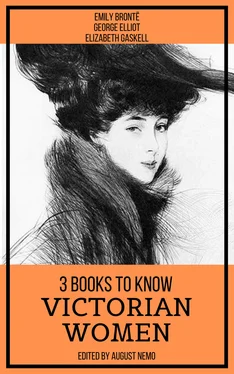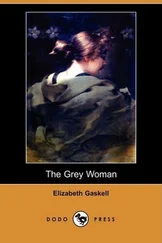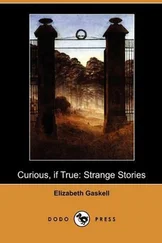"Where your certain point is? No. I should like to be told how a man can have any certain point when he belongs to no party—leading a roving life, and never letting his friends know his address. 'Nobody knows where Brooke will be—there's no counting on Brooke'—that is what people say of you, to be quite frank. Now, do turn respectable. How will you like going to Sessions with everybody looking shy on you, and you with a bad conscience and an empty pocket?"
"I don't pretend to argue with a lady on politics," said Mr. Brooke, with an air of smiling indifference, but feeling rather unpleasantly conscious that this attack of Mrs. Cadwallader's had opened the defensive campaign to which certain rash steps had exposed him. "Your sex are not thinkers, you know—varium et mutabile semper—that kind of thing. You don't know Virgil. I knew"—Mr. Brooke reflected in time that he had not had the personal acquaintance of the Augustan poet—"I was going to say, poor Stoddart, you know. That was what he said. You ladies are always against an independent attitude—a man's caring for nothing but truth, and that sort of thing. And there is no part of the county where opinion is narrower than it is here—I don't mean to throw stones, you know, but somebody is wanted to take the independent line; and if I don't take it, who will?"
"Who? Why, any upstart who has got neither blood nor position. People of standing should consume their independent nonsense at home, not hawk it about. And you! who are going to marry your niece, as good as your daughter, to one of our best men. Sir James would be cruelly annoyed: it will be too hard on him if you turn round now and make yourself a Whig sign-board."
Mr. Brooke again winced inwardly, for Dorothea's engagement had no sooner been decided, than he had thought of Mrs. Cadwallader's prospective taunts. It might have been easy for ignorant observers to say, "Quarrel with Mrs. Cadwallader;" but where is a country gentleman to go who quarrels with his oldest neighbors? Who could taste the fine flavor in the name of Brooke if it were delivered casually, like wine without a seal? Certainly a man can only be cosmopolitan up to a certain point.
"I hope Chettam and I shall always be good friends; but I am sorry to say there is no prospect of his marrying my niece," said Mr. Brooke, much relieved to see through the window that Celia was coming in.
"Why not?" said Mrs. Cadwallader, with a sharp note of surprise. "It is hardly a fortnight since you and I were talking about it."
"My niece has chosen another suitor—has chosen him, you know. I have had nothing to do with it. I should have preferred Chettam; and I should have said Chettam was the man any girl would have chosen. But there is no accounting for these things. Your sex is capricious, you know."
"Why, whom do you mean to say that you are going to let her marry?" Mrs. Cadwallader's mind was rapidly surveying the possibilities of choice for Dorothea.
But here Celia entered, blooming from a walk in the garden, and the greeting with her delivered Mr. Brooke from the necessity of answering immediately. He got up hastily, and saying, "By the way, I must speak to Wright about the horses," shuffled quickly out of the room.
"My dear child, what is this?—this about your sister's engagement?" said Mrs. Cadwallader.
"She is engaged to marry Mr. Casaubon," said Celia, resorting, as usual, to the simplest statement of fact, and enjoying this opportunity of speaking to the Rector's wife alone.
"This is frightful. How long has it been going on?"
"I only knew of it yesterday. They are to be married in six weeks."
"Well, my dear, I wish you joy of your brother-in-law."
"I am so sorry for Dorothea."
"Sorry! It is her doing, I suppose."
"Yes; she says Mr. Casaubon has a great soul."
"With all my heart."
"Oh, Mrs. Cadwallader, I don't think it can be nice to marry a man with a great soul."
"Well, my dear, take warning. You know the look of one now; when the next comes and wants to marry you, don't you accept him."
"I'm sure I never should."
"No; one such in a family is enough. So your sister never cared about Sir James Chettam? What would you have said to him for a brother-in-law?"
"I should have liked that very much. I am sure he would have been a good husband. Only," Celia added, with a slight blush (she sometimes seemed to blush as she breathed), "I don't think he would have suited Dorothea."
"Not high-flown enough?"
"Dodo is very strict. She thinks so much about everything, and is so particular about what one says. Sir James never seemed to please her."
"She must have encouraged him, I am sure. That is not very creditable."
"Please don't be angry with Dodo; she does not see things. She thought so much about the cottages, and she was rude to Sir James sometimes; but he is so kind, he never noticed it."
"Well," said Mrs. Cadwallader, putting on her shawl, and rising, as if in haste, "I must go straight to Sir James and break this to him. He will have brought his mother back by this time, and I must call. Your uncle will never tell him. We are all disappointed, my dear. Young people should think of their families in marrying. I set a bad example—married a poor clergyman, and made myself a pitiable object among the De Bracys—obliged to get my coals by stratagem, and pray to heaven for my salad oil. However, Casaubon has money enough; I must do him that justice. As to his blood, I suppose the family quarterings are three cuttle-fish sable, and a commentator rampant. By the bye, before I go, my dear, I must speak to your Mrs. Carter about pastry. I want to send my young cook to learn of her. Poor people with four children, like us, you know, can't afford to keep a good cook. I have no doubt Mrs. Carter will oblige me. Sir James's cook is a perfect dragon."
In less than an hour, Mrs. Cadwallader had circumvented Mrs. Carter and driven to Freshitt Hall, which was not far from her own parsonage, her husband being resident in Freshitt and keeping a curate in Tipton.
Sir James Chettam had returned from the short journey which had kept him absent for a couple of days, and had changed his dress, intending to ride over to Tipton Grange. His horse was standing at the door when Mrs. Cadwallader drove up, and he immediately appeared there himself, whip in hand. Lady Chettam had not yet returned, but Mrs. Cadwallader's errand could not be despatched in the presence of grooms, so she asked to be taken into the conservatory close by, to look at the new plants; and on coming to a contemplative stand, she said—
"I have a great shock for you; I hope you are not so far gone in love as you pretended to be."
It was of no use protesting against Mrs. Cadwallader's way of putting things. But Sir James's countenance changed a little. He felt a vague alarm.
"I do believe Brooke is going to expose himself after all. I accused him of meaning to stand for Middlemarch on the Liberal side, and he looked silly and never denied it—talked about the independent line, and the usual nonsense."
"Is that all?" said Sir James, much relieved.
"Why," rejoined Mrs. Cadwallader, with a sharper note, "you don't mean to say that you would like him to turn public man in that way—making a sort of political Cheap Jack of himself?"
"He might be dissuaded, I should think. He would not like the expense."
"That is what I told him. He is vulnerable to reason there—always a few grains of common-sense in an ounce of miserliness. Miserliness is a capital quality to run in families; it's the safe side for madness to dip on. And there must be a little crack in the Brooke family, else we should not see what we are to see."
"What? Brooke standing for Middlemarch?"
"Worse than that. I really feel a little responsible. I always told you Miss Brooke would be such a fine match. I knew there was a great deal of nonsense in her—a flighty sort of Methodistical stuff. But these things wear out of girls. However, I am taken by surprise for once."
Читать дальше












